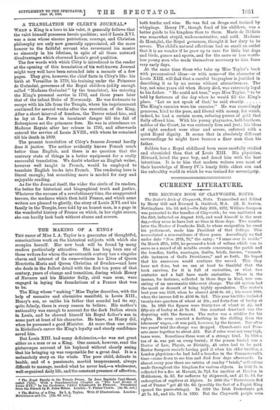A TRANSLATION OF CLERY'S JOURNAL* WHEN a King is a
hero to his valet, it generally follows that the valet himself possesses heroic qualities; and if Louis XVL was a. man whose sincere patriotism, courage, and Christian philosophy are only now generally appreciated, all the more honour to the faithful servant who reverenced his master so sincerely in his lifetime, in spite of all those outward disadvantages which obscured Louis's good qualities.
The few words with which Clery is introduced to the reader at the opening of this translation of his well-known Journal might very well have been extended into a memoir of a few pages. They give, however, the chief facts in Clery's life: his birth at Versailles in 1758, his training under the Princesse de Guemene, governess of the Royal children (oddly enough called "Madame Guemene " by the translator), his entering the King's personal service in 1782, and three years later that of the infant Duke of Normandy. He was fortunate to escape with his life from the Temple, where his imprisonment continued for several weeks after the execution of the Ring After a short interval of freedom, the Terror seized him, and be lay at La Force in imminent danger till the fall of Robespierre set the prisoners free. He was in attendance on Madame Royale after her release in 1795, and afterwards entered the service of Louis xvm., with whom be remained till his death in 1809.
The present translation of Clery's famous Journal hardly does it justice. The author evidently knows French much better than English, and there is no question that the contrary state of things is a better equipment for a really successful translation. We doubt whether an English writer, however well taught in French, would be employed to translate English books into French. The rendering here is literal enough; but something more is needed for easy and enjoyable reading.
As for the Journal itself, the wider the circle of its readers, the better for historical and biographical truth and justice. Whatever the excuses of a revolutionary time, the exaggerated terrors, the madness which then held France, and which some writers are pleased to glorify, the story of Louis XVI. and his family in the Temple, here told by an honest man, is a page in the wonderful history of France on which, in her right senses, she can hardly look back without shame and sorrow.






















































 Previous page
Previous page